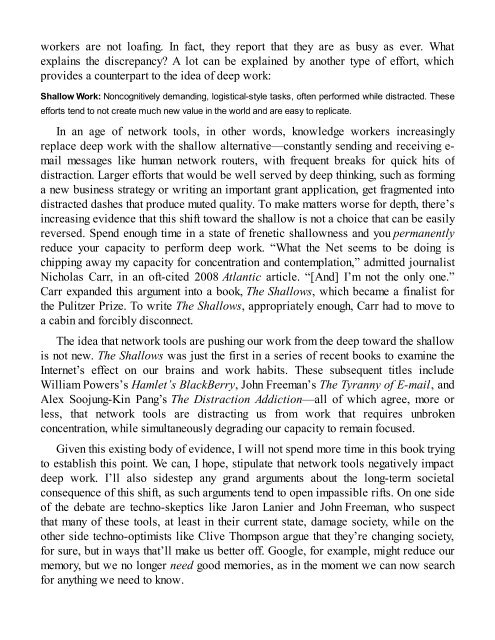Deep Work_ Rules for focused success in a distracted world ( PDFDrive.com )
Create successful ePaper yourself
Turn your PDF publications into a flip-book with our unique Google optimized e-Paper software.
workers are not loaf<strong>in</strong>g. In fact, they report that they are as busy as ever. What<br />
expla<strong>in</strong>s the discrepancy? A lot can be expla<strong>in</strong>ed by another type of ef<strong>for</strong>t, which<br />
provides a counterpart to the idea of deep work:<br />
Shallow <strong>Work</strong>: Noncognitively demand<strong>in</strong>g, logistical-style tasks, often per<strong>for</strong>med while <strong>distracted</strong>. These<br />
ef<strong>for</strong>ts tend to not create much new value <strong>in</strong> the <strong>world</strong> and are easy to replicate.<br />
In an age of network tools, <strong>in</strong> other words, knowledge workers <strong>in</strong>creas<strong>in</strong>gly<br />
replace deep work with the shallow alternative—constantly send<strong>in</strong>g and receiv<strong>in</strong>g e-<br />
mail messages like human network routers, with frequent breaks <strong>for</strong> quick hits of<br />
distraction. Larger ef<strong>for</strong>ts that would be well served by deep th<strong>in</strong>k<strong>in</strong>g, such as <strong>for</strong>m<strong>in</strong>g<br />
a new bus<strong>in</strong>ess strategy or writ<strong>in</strong>g an important grant application, get fragmented <strong>in</strong>to<br />
<strong>distracted</strong> dashes that produce muted quality. To make matters worse <strong>for</strong> depth, there’s<br />
<strong>in</strong>creas<strong>in</strong>g evidence that this shift toward the shallow is not a choice that can be easily<br />
reversed. Spend enough time <strong>in</strong> a state of frenetic shallowness and you permanently<br />
reduce your capacity to per<strong>for</strong>m deep work. “What the Net seems to be do<strong>in</strong>g is<br />
chipp<strong>in</strong>g away my capacity <strong>for</strong> concentration and contemplation,” admitted journalist<br />
Nicholas Carr, <strong>in</strong> an oft-cited 2008 Atlantic article. “[And] I’m not the only one.”<br />
Carr expanded this argument <strong>in</strong>to a book, The Shallows, which became a f<strong>in</strong>alist <strong>for</strong><br />
the Pulitzer Prize. To write The Shallows, appropriately enough, Carr had to move to<br />
a cab<strong>in</strong> and <strong>for</strong>cibly disconnect.<br />
The idea that network tools are push<strong>in</strong>g our work from the deep toward the shallow<br />
is not new. The Shallows was just the first <strong>in</strong> a series of recent books to exam<strong>in</strong>e the<br />
Internet’s effect on our bra<strong>in</strong>s and work habits. These subsequent titles <strong>in</strong>clude<br />
William Powers’s Hamlet’s BlackBerry, John Freeman’s The Tyranny of E-mail, and<br />
Alex Soojung-K<strong>in</strong> Pang’s The Distraction Addiction—all of which agree, more or<br />
less, that network tools are distract<strong>in</strong>g us from work that requires unbroken<br />
concentration, while simultaneously degrad<strong>in</strong>g our capacity to rema<strong>in</strong> <strong>focused</strong>.<br />
Given this exist<strong>in</strong>g body of evidence, I will not spend more time <strong>in</strong> this book try<strong>in</strong>g<br />
to establish this po<strong>in</strong>t. We can, I hope, stipulate that network tools negatively impact<br />
deep work. I’ll also sidestep any grand arguments about the long-term societal<br />
consequence of this shift, as such arguments tend to open impassible rifts. On one side<br />
of the debate are techno-skeptics like Jaron Lanier and John Freeman, who suspect<br />
that many of these tools, at least <strong>in</strong> their current state, damage society, while on the<br />
other side techno-optimists like Clive Thompson argue that they’re chang<strong>in</strong>g society,<br />
<strong>for</strong> sure, but <strong>in</strong> ways that’ll make us better off. Google, <strong>for</strong> example, might reduce our<br />
memory, but we no longer need good memories, as <strong>in</strong> the moment we can now search<br />
<strong>for</strong> anyth<strong>in</strong>g we need to know.



